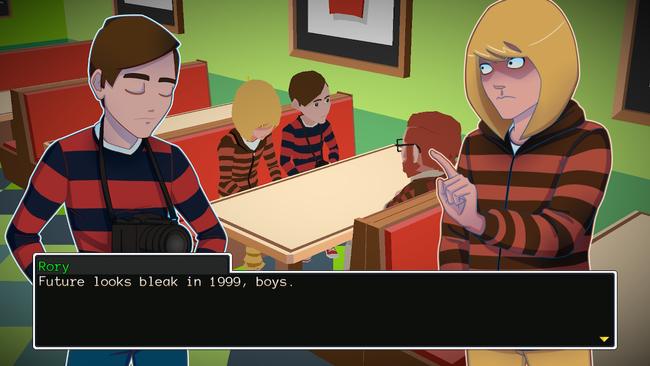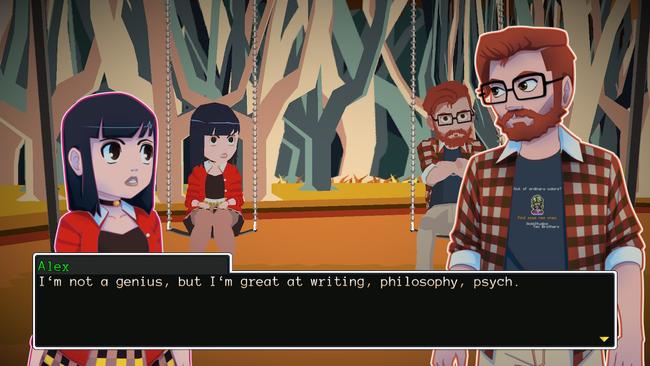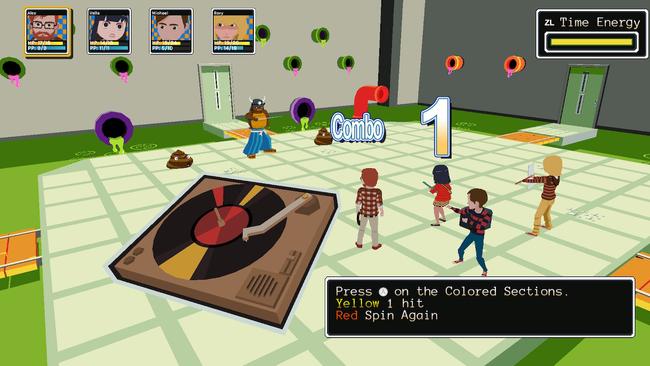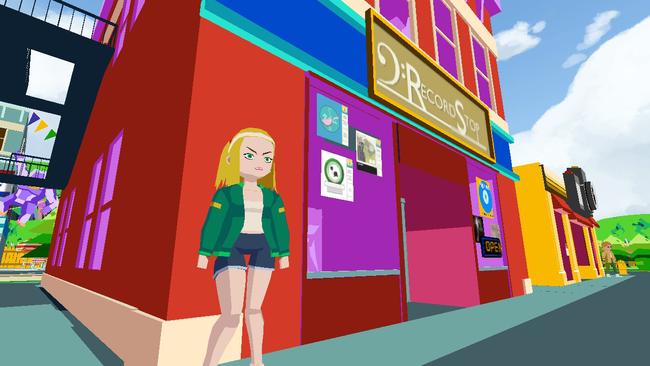
YIIK: A Postmodern RPG Review
Fictional media has always loved theories about the world ending on some soon upcoming date. Perhaps the most well-known was the Year 2K Problem. Although these days it has understandably fallen from the spotlight, it did spawn many pieces of entertainment pertaining to the supposed end of the world back in its day. Almost 20 years later, YIIK: A Postmodern RPG is bringing back the homonymous event in videogame form, though its degree of success leaves a lot to be desired.
YIIK tells the story of Alex, a college graduate that has just returned to his hometown of Frankton in April of 1999, only to witness to a very peculiar situation: a girl he just met gets taken away into nothingness by mysterious cosmic figures. From there, he enlists the help of new friends in order to try and solve this mystery that seems to relate to the Year 2K Problem in some form.

While the setup of the story sounds interesting on paper, it ends up falling short of its potential in many ways. For starters, Alex is not a good character, much less a good protagonist. Most of the other characters don’t really get enough development to remain interesting through the course of the entire game but Alex is the worst offender, even though him wanting to become a better person is part of the narrative.
For almost the entirety of the game, Alex acts like that kind of guy who took a semester of introductory philosophy and suddenly thinks that he is the smartest person around and that everyone wants to listen to him. A lot of the story is presented through monologues narrated by Alex, but instead of being an interesting window into the events that transpire, they are nothing but poor metaphors from someone trying to sound smarter than they are. When he eventually realizes his flaws, it is too little, since he only realizes he is kind of an asshole but not why, and too late, since it's a development that comes into play in the last couple of hours of the game.
I also feel the need to mention that there are a lot of things Alex and other characters say that some people can find offensive. There’s casual sexism and casual racism, comments about “unladylike” conducts, creepy talk about women’s ages, a boss whose only attack consist of flashing his genitals (thankfully obscured by the camera angle), a very weird attempt at a joke by Alex equating the adjective “ginger” to the n-word, some very rough language in a fake Internet forum that includes people throwing the r-word and other very unpleasant insults, and a lot of comments about overweight people that border mockery.
If you can get past that, you’ll find that the plot itself is a bit of a hit or miss. The story has some interesting things to say about loss, coping mechanisms, and death, but they are obfuscated by an extreme amount of sci-fi talk and exposition that muddles whatever message the game might be trying to convey, coupled with abysmal pacing in the last third of the game. There are several complex terms and concepts, some even made up for the game, that intertwine with each other making things difficult to follow to the point where even the version of Year 2K Problem that the game presents isn’t properly explained because the plot lacks a sense of focus.

The story could be easier to plow through if the gameplay was good enough to carry the game, but unfortunately, that aspect isn’t up to the task. When it comes to its RPG elements, YIIK is simply not good.
Exploration is fine, though the game could use a map function. There are a few towns with NPCs you can talk to and a few dungeons that you visit over the course of the story. The dungeons are quite varied and have some interesting puzzles to solve with the various tools Alex can use exclusively for exploration, like a skateboard or a cat. However, the further you get into the game, the more obtuse said puzzles become, requiring you to think of solutions that sometimes involve using those tools in ways that the game never suggests you could. And on top of that, some of the later dungeons had bugs that forced me to reload previous saves, like key items just vanishing, puzzles that refused to stay solved or the game just crashing outright.
As for the combat, it consists of turn-based battles where you control a party of up to four characters. Some of them have quite different skill sets, like one character that can’t attack but can protect any other party member or another that uses their HP to attack. In spite of this, their usefulness is quickly overshadowed by other characters who clearly have better tools.
Enemy design is varied enough, but the combat system makes the variation meaningless. Whenever you attack or are attacked, there’s a minigame you have to play. Different skills have different minigames but they all amount to pressing buttons with certain timing and within a time limit. While the idea is novel at first, it quickly becomes a burden since it is part of almost every action that happens in combat. These minigames make the fights drag for way longer than they should, especially as there aren’t many multi-target skills and some of the minigames have unresponsive controls or poorly explained instructions.

Even worse, in the 25 hours that took me to beat YIIK, I could never understand how damage values worked. Failing a minigame most of the times means not dealing damage at all and wasting whatever resources you used as there’s no concept of hit chance, but sometimes succeeding didn’t get logical results. No matter how I distributed my stats upon leveling up, sometimes I would do more damage to enemies of higher level performing poorly at the minigames than I would at lower level enemies with flawless execution. There doesn’t seem to be any sort of weaknesses system at play, which makes things even more confusing and repetitive. There’s almost no strategy, only proper execution of the minigames.
Generally, being confusing is perhaps the game’s biggest problem overall; YIIK is not good at conveying information to the player. Damage values and character stats are never explained, to the point where there’s a Luck stat that I don’t know what it affects. You spend the first three hours without being able to level up without knowing why and when you do, you have to level up everyone manually and outside of battle. EXP gain makes no sense, with bosses sometimes giving less than random fights. Some boss fights require you to lose but the game will never tell you until your entire party dies after wasting a lot of time and resources. The inventory is unwieldy and the game never tells you that there is a sorting button. There’s an entire side quest system that I found in the last hour of the game because there’s no menu for it and the game never points you in its direction. The loading screen tips are used for jokes instead of actual tips. While some of this might be intentional due to its reverence for old RPGs, it only ends up hurting the overall experience.
Thankfully, the game is a joy to look at. It has a very sharp art style and a wide variety of environments that make great use of camera angles and colors. While personally, the character design is not something I liked, it does make me think of MTV shows from the late ’90s like Celebrity Deathmatch, which goes well with the game’s setting. There’s some pixel art too that doesn’t exactly fit with the rest of the aesthetic, though it might work for some people who value nostalgia more.

The music is also great, with a wide array of completely different battle themes that seem to be picked at random and a couple of amazing vocal tracks for specific moments that really elevate the atmosphere of certain scenes. Just like with the pixel art, however, there are quite a few of chiptune songs that don’t especially match the rest of the presentation of the game.
YIIK: A Postmodern RPG is a game that falls under the weight of its own ambition. Sloppy storytelling, bad pacing, poor characters, and some questionable (and potentially offensive) writing undermine what could have been an interesting story about young adults in the late ’90s, and the gameplay can’t carry the rest of the experience on its own. Even if it looks and sounds good, it’s just not enough to make its 25 hours an enjoyable time.